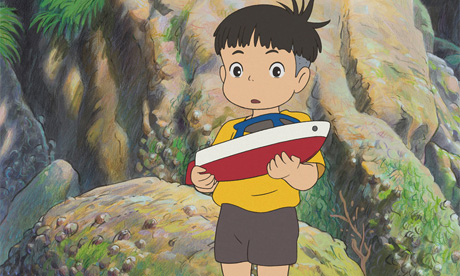
Despite being responsible for Japan's most successful film of all time, Spirited Away director Hayao Miyazaki is known as something of a recluse. But he has made a rare foray into the limelight to criticise the rise of nationalism in his home nation and to call for increased measures to improve the environment.
During a press conference in Tokyo to promote his latest film, Ponyo on the Cliff, which has already grossed $153m in Japan and picked up two awards at the Venice film festival, Miyazaki said he was disappointed by the actions of Japan's disgraced head of the airforce, general Toshio Tamogami, who was fired earlier this month after he wrote an essay defending his country's actions in the second world war.
"We need to liberate our children from nationalism," Miyazaki said. "The nationalistic view suggests the problems in the world come from its multi-ethnicity. [It] creates a possibility for the country we love to turn into something negative for the world as a whole. This is a lesson we learned from the past war and which we cannot forget."
The 67-year-old Academy award-winner also derided Japan's environmental policies - as well as those of the world in general - a theme highlighted in his films Princess Mononoke and Spirited Away, which holds the all-time box office record in Japan with a stunning 30bn Yen yield.
Miyazaki's work often touches on the innocence of children and posits the view that they offer hope for humanity's future. Ponyo on the Cliff, which centres on a young boy who befriends a goldfish that wants to be human, is the latest example. It will be widely released in Europe and north America in 2009. The director has also driven home his point outside the world of film: his company Studio Ghibli recently opened a creche in Tokyo after Miyazaki decried the lack of childcare facilities.
The film-maker spoke enthusiastically about the venture during his talk at the foreign correspondence club. "Here in Japan we have much potential future uncertainty, which applies to the workplace and also how we should raise our children," he said.
"[But] as they ran wild in the [facility's] garden we saw that they were quickly able to adapt themselves. There were many cases where they may have been threatened, but they did not cry… It was truly an astonishing thing to see. There was no longer an uncertainty about our children."

